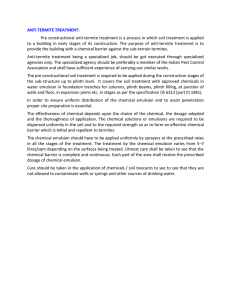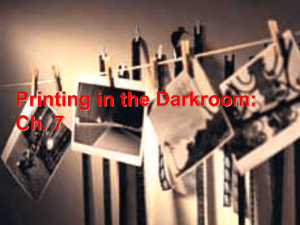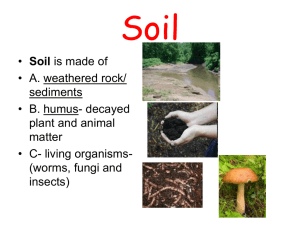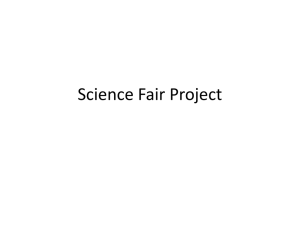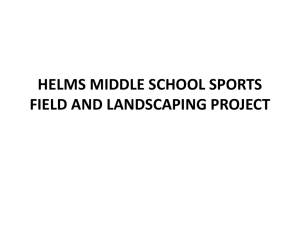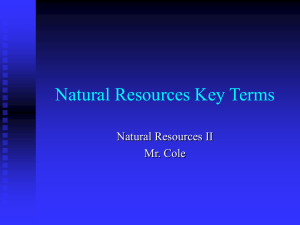ANTI-TERMITE PRE-CONSTRUCTION CHEMICAL TREATMENT IN
advertisement
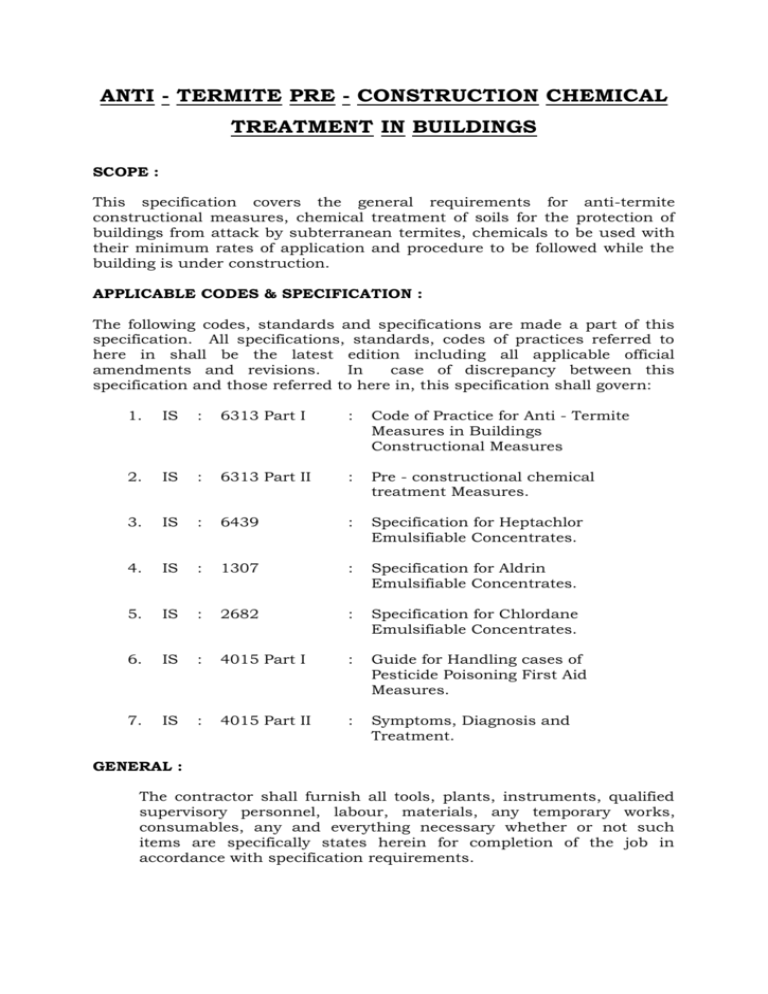
ANTI - TERMITE PRE - CONSTRUCTION CHEMICAL TREATMENT IN BUILDINGS SCOPE : This specification covers the general requirements for anti-termite constructional measures, chemical treatment of soils for the protection of buildings from attack by subterranean termites, chemicals to be used with their minimum rates of application and procedure to be followed while the building is under construction. APPLICABLE CODES & SPECIFICATION : The following codes, standards and specifications are made a part of this specification. All specifications, standards, codes of practices referred to here in shall be the latest edition including all applicable official amendments and revisions. In case of discrepancy between this specification and those referred to here in, this specification shall govern: 1. IS : 6313 Part I : Code of Practice for Anti - Termite Measures in Buildings Constructional Measures 2. IS : 6313 Part II : Pre - constructional chemical treatment Measures. 3. IS : 6439 : Specification for Heptachlor Emulsifiable Concentrates. 4. IS : 1307 : Specification for Aldrin Emulsifiable Concentrates. 5. IS : 2682 : Specification for Chlordane Emulsifiable Concentrates. 6. IS : 4015 Part I : Guide for Handling cases of Pesticide Poisoning First Aid Measures. 7. IS : 4015 Part II : Symptoms, Diagnosis and Treatment. GENERAL : The contractor shall furnish all tools, plants, instruments, qualified supervisory personnel, labour, materials, any temporary works, consumables, any and everything necessary whether or not such items are specifically states herein for completion of the job in accordance with specification requirements. All work shall be done in the order of progress required by Owner’s construction programme. The contractor shall take all necessary precautions to prevent any accident in connection with the performance of the work. On final completion of all the work, the contractor shall leave the entire premises within the site of his operation clean and free from all rubbish resulting from his operation. The owner reserves the right to inspect, check and direct any or all operations at any stage of the work and to required unsatisfactory work to be remedied at the contractor’s expense. No work shall be carried out under unsuitable weather conditions viz. when raining or when the soil is wet due to rain or sub-soil water. Chemicals shall be brought to site of work is sealed original containers. The materials shall be brought in, at a time, in adequate quantity to suffice for the work. The materials shall be kept in cool and locked stores. The empties shall not be removed from the work site till the relevant item of work has been completed and permission granted by Owner / Engineer. Chemicals available in concentration forms with concentration indicated on the sealed containers only shall be used. Chemicals shall be diluted with water in required quantity before use, using graduated containers to achieve the desired percentage of concentration: Examples : Aldrin 20 - 1 lt. is diluted to 40 lts. to give 0.5% emulsion. Aldrin 18 - 1 lt. is diluted to 35 lts. to give 0.5% emulsion. Chlordane 20 - 1 lt. is diluted to 20 lts. to give 1.0% emulsion. PRE - CONSTRUCTIONAL CHEMICAL TREATMENT : ESSENTIAL REQUIREMENTS : Hand operated pressure pump with graduated containers shall be used to ensure uniform spraying of the chemicals. Continuous check shall be kept to ensure that the specified quantity of chemical is used for the required area during the operation. CONDITION OF FORMATION : The treated soil barrier shall be complete and continuous under the whole of the structure to be protected. All foundations shall be fully surrounded by and in close contact with the barrier of treated soil. Each part of the area treated shall receive the specified dosage of chemical. TIME OF APPLICATION : Soil treatment shall start when the foundation trenches and pits are ready to receive mass concrete in foundations. Laying of mass concrete shall start when the chemical emulsion has been absorbed by the soil and the surface is quite dry. Treatment shall not be carried out when it is raining or soil is wet with rain or sub-soil water. The foregoing earth surface within the plinth before laying the subgrade for the floor. DISTURBANCE : The treated soil barriers shall not be disturbed after they are formed. If by chance, treated soil barriers are disturbed immediate steps shall be taken to restore the continuity and completeness of the barrier system. CHEMICALS, METHOD AND RATE OF APPLICATION : a. MOUND TREATMENT : Termite mounds within the plinth and contingent apron area shall be destroyed by means of insecticides in the form of water suspension or emulsion which shall be poured into the mounds at several places after breaking open the earthen structure and making holes with crow bars. For a mound volume of about one (1) cum, four (4) litres of an emulsion in water of one of the following shall be used. i. 0.25 % Aldrin ii. 0.25% Heptachlor iii. 0.5% Chlordane b. SOIL TREATMENT : Any one of the following chemical (conforming to Indian Standards) in water emulsion shall be applied uniformity over the area to be treated. CHEMICAL Aldrin Heptachlor Chlordane CONCENTRATION BY WEIGHT % 0.5 0.5 1.0 TREATED OF COLUMN - PITS, WALL TRENCHES AND BASEMENT EXCAVATION : a. The bottom surface and the sides (up to a height of about 300mm) of the excavation made for column pits, wall trenches and basements shall be treated with the chemical at the rate of 5 litres per Sq.M. of the surface area. b. After the column foundations and the retaining walls of the basement come up, the backfill in immediate contract with the foundation structure shall be treated at the rate of 15 litre / Sq.M. of the vertical surface of the sub-structure for each side. If water is used for ramming the earth-fill, the chemical treatment shall be carried out after the ramming operation is done by rodding the earth at 150mm centres close to the wall surface and spraying the chemical with the above done. The earth shall be returned in layers and the treatment shall be carried out in similar stages. The chemical emulsion shall be directed towards the concrete or masonry surface of the columns and wall so that the earth in contact with these surfaces is well treated with the chemical. c. In the case of RCC framed structures with cloumns and plinth beams and RCC basements, with concrete mix 1:2:4 or richer, the treatment shall start at the depth of 500 mm below ground level for columns and plinth beams. From this depth the back-fill around the columns, beams and RCC basement walls shall be treated at the rate of 15 litres / Sq.M. of vertical surface. The other details of treatment shall be as laid down in clause (b) above. TREATMENT OF TOP SURFACE OF PLINTH FILLING : The top surface of the filled earth within plinth beams / walls shall be treated with chemical emulsion at the rate of 5 lts./Sq.M. of the surface before the sand bed/subgrade is laid. Holes upto 50 to 70mm deep at 150mm centres bothways shall be made with 12mm dia crow-bar on the surface to facilitate saturation of the soil with chemical emulsion. TREATMENT OF JUNCTION OF WALL AND FLOOR : To achieve continuity of vertical chemical barrier to inner wall surfaces from the ground level, small channel 30 x 30 mm shall be made at all the junctions of wall and columns with the floor (before laying the subgrade) and rod holes made in the channel upto ground level 150mm apart and the chemical emulsion poured along the channel at the rate of 15 litres / Sq.M. of the vertical wall or column surface so as to soak the soil right to the bottom. The soil be tamped back into place after this operation. TREATMENT OF SOUL UNDER APRON ALONG EXTERNAL PERIMETER OF BUILDING The top surface of the consolidated earth over which the apron is to be laid shall be reacted with chemical emulsion at the rate of 5 litres / Sq.M. of the surface before the apron is laid, by making rod holes 75 mm deep at 150mm centres both ways. These chemicals are usually brought to site in the form of emulsifiable concentrates. The containers should be clearly labelled and should be stored carefully so that children and pet cannot get at them. They shall be kept securely closed. Particular care shall be taken to prevent skin contact with concentration. Prolonged exposure to dilute emulsions shall also be avoided. Workers shall wear clean clothing and wash thoroughly with soap and water, especially before eating and smoking. In the event of severe contamination, clothing shall be removed at once and the skin washed with soap and water. If chemicals splash into eyes they shall be flushed with plenty of soap and water and immediate medical attention shall be sought. The concentrates are oil solutions and present a fire hazard owing to the use of petroleum solvents. Flames shall not be allowed during mixing. Care shall be taken in the application of chemicals to see that they are not allowed to contaminate wells or springs which serve as source of drinking water. MEASUREMENTS: The measurements shall be made in sq.m. on the basis of plinth area of the building at ground floor only for all operations described above. Nothing extra shall be measured. RATE : The rate shall include the cost of all materials and labour involved in al the operations described above including making holes and refilling and making good the same.
